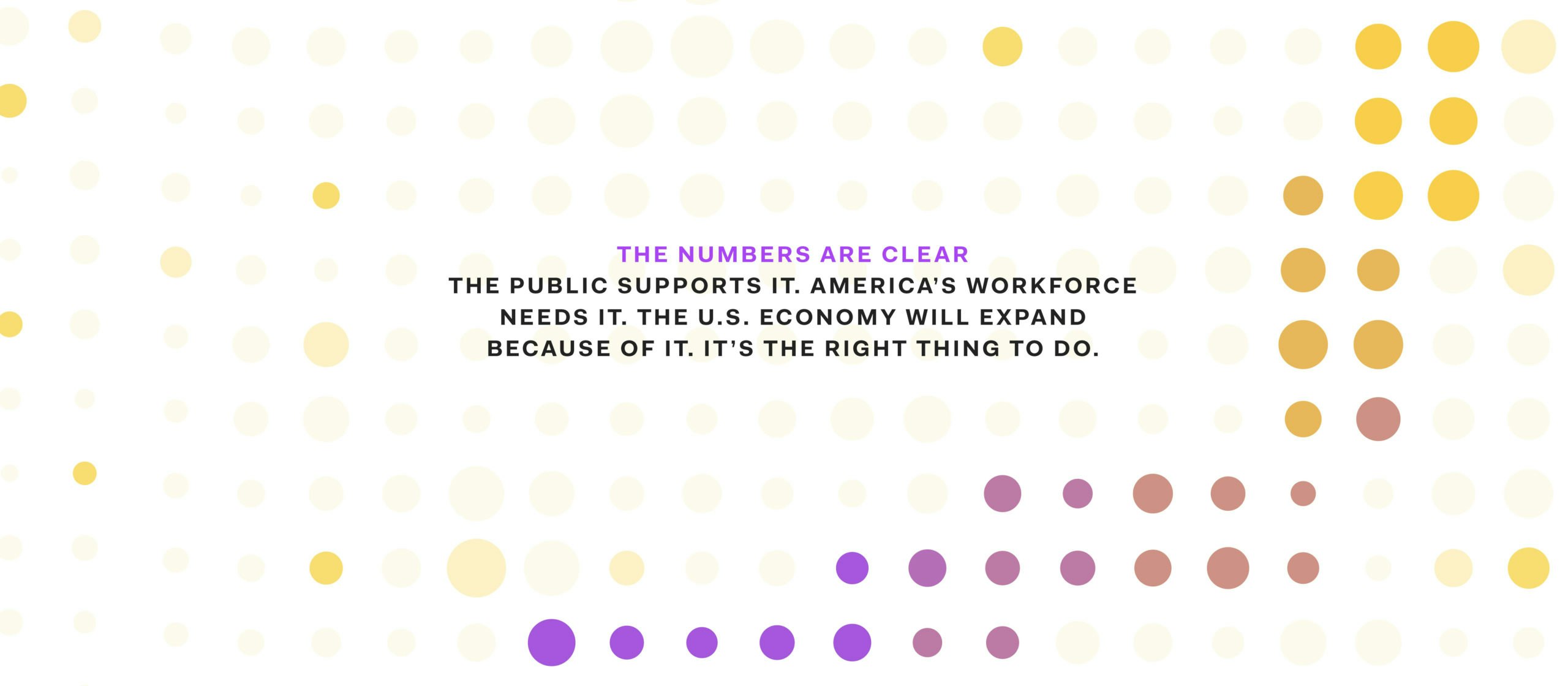“Families with undocumented members need the stability and certainty that comes with legal status so they can achieve their maximum economic potential, and add to America’s post-pandemic recovery.”
Overview
FWD.us estimates that nearly all undocumented immigrants belong to groups that most Americans say should be provided a pathway to citizenship. These groups include essential workers, Dreamers who came to the U.S. as children, undocumented individuals living in the U.S. for many years, those with U.S. citizen family members, or those who currently have temporary protection from deportation.
See our interactive for multiple pathways to U.S. citizenship.
Multiple pieces of commonsense legislation providing a pathway to citizenship for many of these groups have bipartisan support in Congress, but Congress has failed to pass this kind of legislation for decades. It’s well past time for Congress to provide the certainty that undocumented immigrants need as they work essential jobs, go to school, support their families, and help rebuild the American economy.
FWD.us polling over the past several months shows a similar theme: the U.S. public strongly supports granting undocumented residents already living in the U.S. the ability to earn citizenship. Clear majorities of the American public support a pathway to citizenship for various undocumented groups. For example, recent national polling found that 71% of the U.S. public supports the Dream Act, a bill that would give Dreamers, or those who came to the U.S. as children, a pathway to citizenship. Similarly, 71% of respondents in the same poll support offering a pathway to citizenship to farmworkers, while 66% support offering citizenship to essential workers.
Recent FWD.us polling also finds a similarly strong level of support in battleground states, including Arizona, Georgia, Florida, Nevada, North Carolina, Pennsylvania, and Wisconsin. We found a large majority of people in these states supports a pathway to citizenship for undocumented groups, in the states that could determine control of Congress next year and the Presidency in 2024. A pathway to citizenship for undocumented immigrant groups is an incredibly popular policy in places where it will matter most electorally.
In this combined subset of battleground states, the U.S. public supports creating a pathway to citizenship for several undocumented immigrant groups. Key takeaways include:
- 79% support creating a pathway to citizenship for undocumented immigrants living in the U.S. 10 years or longer.
- 79% support citizenship for undocumented immigrants with U.S. citizen children, while 75% support citizenship for those married to U.S. citizens.
- 71% support citizenship for people seeking asylum, and a further 68% support citizenship for undocumented immigrants who are temporarily protected from deportation.
Undocumented immigrants are a vital part of America’s workforce, particularly as the U.S. continues to respond to and recover from the COVID-19 pandemic. FWD.us estimates show that substantial shares of critical occupations nationwide are filled by undocumented individuals, including crucial jobs in farming (34%), construction (13%), building grounds and maintenance (13%), food preparation and services (7%), and manufacturing and production (7%), with even higher shares for some occupation groups in California, Texas, Florida, Nevada, New Jersey, and Georgia. With the economy projected to be near full employment by the end of 2022, the U.S. will need every person available to continue fighting the pandemic and rebuilding America’s infrastructure.
See our interactive for estimates of the undocumented share of critical occupations in the American workforce.
FWD.us analysis also identifies that, when previously undocumented immigrants become U.S. citizens, they are more likely to live two times or more above the poverty line and file taxes. This should assuage some fiscal concerns of Congress as it considers legislation that includes a pathway to citizenship.
This greater economic prosperity associated with citizenship carries important multiplier effects for the U.S. economy. FWD.us estimates that undocumented immigrants earning U.S. citizenship would annually contribute an additional $149 billion after taxes to the economy. This could result in a potential annual increase of $39 billion more in combined federal, state, and local taxes.
See our interactive of economic estimates for improved lives when undocumented immigrants are granted U.S. citizenship.
Congress must stop wasting time and needs to act and pass a pathway to citizenship. Families with undocumented members need certainty to live in freedom and safety, achieve financial stability, and maximize their economic potential. America’s full post-pandemic recovery depends on it.




